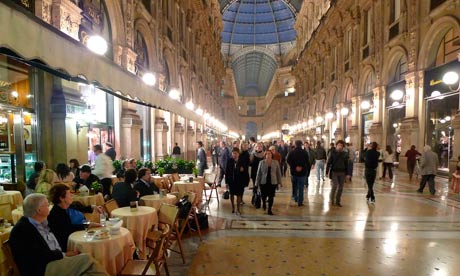Berlusconi government's battle to stay in the eurozone is not just about the country's €2tn debt, the largest among member states
Italians in Milan enjoy a GDP per capita nearly twice that of those in Naples, below, where rubbish is going uncollected. Photograph: Mike Longhurst/Rex Features Silvio Berlusconi's government is battling to stay in the eurozone against mounting odds – not least the country's mountain of state debt, which is the largest in the single currency area.
Berlusconi's key voters are shopkeepers and other small business people, professionals and sections of a middle class that likes the way life was 30 years ago. Making matters worse, Italian workers have paid themselves more than their German equivalents over the past 10 years for doing less work, less productively.
The German miracle is certainly about planning and investment, but it is also based on a decline in average real wages, cuts in benefits and pensions, and an erosion in job security.
Demanding the same of Italians comes as a painful shock. Neither left nor rightwing parties favour the kind of overhaul demanded by Brussels. The country, with a wealthy industrial north and poorer south, is a microcosm of the eurozone. It is the single currency's third biggest economy, but could now face a real struggle to stay in the euro.
Citigroup analyst Matt King, said that Italy is "quite close to the point beyond which other sovereigns have found it very difficult to return, when [interest rates] breach 6%".
 Naples rubbish crisis. Photograph: Eric Vandeville/Gamma- Rapho
Naples rubbish crisis. Photograph: Eric Vandeville/Gamma- Rapho
There is an apocryphal story told in the northern region of Liguria, which tells of the €2bn spent upgrading a motorway in the south. The road was built and tolls installed only for locals to smash the collection booths days after the opening.The north of Italy is far richer than the south, and the north has long resented what many there see as the financial drain of the south.
While the rightwing Northern League, which wants Italy to split in two, has made little headway after decades of campaigning, its leader, Umberto Bossi, is now influential. He could either take over from Berlusconi or be kingmaker to a sympathetic member of Berlusconi's centrist Forza Italia party. According to economist Pietro Reichlin of Luiss University in Rome, however, there is not enough resentment to force a split. And several areas of the south are showing signs of regeneration, belying the stereotypes perpetuated in the north.
Tax avoidance is common among many thousands of legitimate small businesses, according to Reichlin, who says a bizarre and byzantine tax system, which punishes startups and the self employed, encourages widespread evasion.
The Germans moved their consumer brands upmarket while the Italians kept it cheap and cheerful. Then came the Chinese and wiped them out.
Today, China has a trade surplus of €40bn with Italy. Ten years ago it was zero.
Going back to 1990, textiles were the number one export product, accounting for around 18% of total exports. Today this has fallen to just 11%, after cheaper imports from China eroded Italy's historic competitive advantage. Fiat made a valiant attempt to export cars to China, but the excursion stalled once Beijing's newly rich spotted the showrooms for Audi, BMW and Mercedes.
At the last major budget meeting in July, politicians of the left and right buried their differences to agree on strengthening a four-year budget that privatised local authority-owned companies (a huge source of patronage and corruption), and ended the stranglehold of the ordini – self-regulating associations that control entry into the law, medicine and other professions. But a backlash from these key constituencies shocked Berlusconi's supporters and the reforms look in doubt.
The centre-left Democratic party, which championed the reforms, has rejected watering down protections for employees in medium and large companies that block redundancies or any cuts in terms and conditions.
__________________ | __________________
The German miracle is certainly about planning and investment, but it is also based on a decline in average real wages, cuts in benefits and pensions, and an erosion in job security.
Demanding the same of Italians comes as a painful shock. Neither left nor rightwing parties favour the kind of overhaul demanded by Brussels. The country, with a wealthy industrial north and poorer south, is a microcosm of the eurozone. It is the single currency's third biggest economy, but could now face a real struggle to stay in the euro.
Debt
The country has a €2tn (£1.7tn) debt mountain equal to around 120% of national output. Interest rates on Italian 10-year bonds have now jumped to 6.4% on the global bond markets – well above the 6% at which traders hit the panic button on whether a country can keep borrowing. This high interest is why Berlusconi has now had to accept the arrival of inspectors from the International Monetary Fund.
To put it in context, the yield – or interest rate – is well above the 3.1% paid by France and 2.8% enjoyed by Germany. Portugal, Ireland and Greece all reached the point of no return after their costs of borrowing topped 6%. Some analysts argue Italy can survive for a year or two paying these sky-high loan rates, but others think that paying double the average interest rate of 3% is unsustainable.
North/South divide
 Naples rubbish crisis. Photograph: Eric Vandeville/Gamma- Rapho
Naples rubbish crisis. Photograph: Eric Vandeville/Gamma- Rapho There is an apocryphal story told in the northern region of Liguria, which tells of the €2bn spent upgrading a motorway in the south. The road was built and tolls installed only for locals to smash the collection booths days after the opening.The north of Italy is far richer than the south, and the north has long resented what many there see as the financial drain of the south.
While the rightwing Northern League, which wants Italy to split in two, has made little headway after decades of campaigning, its leader, Umberto Bossi, is now influential. He could either take over from Berlusconi or be kingmaker to a sympathetic member of Berlusconi's centrist Forza Italia party. According to economist Pietro Reichlin of Luiss University in Rome, however, there is not enough resentment to force a split. And several areas of the south are showing signs of regeneration, belying the stereotypes perpetuated in the north.
Taxes
There is still a huge hidden economy and persistent mafia business ethics and corruption at the highest levels that are more prevalent in the south than the north. Only Greece and Mexico have larger hidden economies among the 25 richest countries. According to a World Bank study last year, the size of Italy's non-taxed economy is 27%, compared with 27.5% for Greece, 16% in Germany and 12.5% in the UK.Tax avoidance is common among many thousands of legitimate small businesses, according to Reichlin, who says a bizarre and byzantine tax system, which punishes startups and the self employed, encourages widespread evasion.
Business
Of all the countries in Europe, Italy is the one to feel the biggest impact of the Chinese manufacturing monster. Where once Milan, Turin and Bologna once stood as proud industrial cities, Italy now lies stripped of its textile industry and battered by the onslaught of cheap consumer durables.
Today, China has a trade surplus of €40bn with Italy. Ten years ago it was zero.
Going back to 1990, textiles were the number one export product, accounting for around 18% of total exports. Today this has fallen to just 11%, after cheaper imports from China eroded Italy's historic competitive advantage. Fiat made a valiant attempt to export cars to China, but the excursion stalled once Beijing's newly rich spotted the showrooms for Audi, BMW and Mercedes.
Jobs
Italy's nepotistic jobs market fuels a steady brain drain as young and educated workers move abroad. The country has one of the highest rates of emigration, with young people often citing family patronage as the reason. A father-to-son policy of succession is still allowed in many industries, which can block out better educated graduates. The youth unemployment rate is now 30%.At the last major budget meeting in July, politicians of the left and right buried their differences to agree on strengthening a four-year budget that privatised local authority-owned companies (a huge source of patronage and corruption), and ended the stranglehold of the ordini – self-regulating associations that control entry into the law, medicine and other professions. But a backlash from these key constituencies shocked Berlusconi's supporters and the reforms look in doubt.
The centre-left Democratic party, which championed the reforms, has rejected watering down protections for employees in medium and large companies that block redundancies or any cuts in terms and conditions.
__________________ | __________________

No comments:
Post a Comment
Note: only a member of this blog may post a comment.